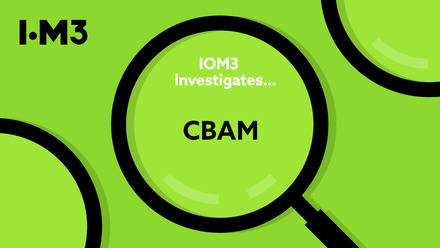Engineering institutes and mineral products association release priorities for new UK Government
The National Engineering Policy Centre (NEPC), EngineeringUK and the Mineral Products Association have released their respective policy priorities ahead of the UK's upcoming General Election.

The next government must commit to a long-term industrial strategy that draws on the UK's strength in engineering, innovation, research and manufacturing - according to the NEPC, led by the Royal Academy of Engineering.
Engineering a resilient and prosperous future: policy priorities for the next UK parliament calls for the next government to take a holistic, long-term approach to complex challenges such as climate change and slow growth.
The policy priorities set out are being backed by 42 engineering organisations and represents more than 700,000 UK engineers. The NEPC report highlights that engineering posts are 20% of national jobs, while the engineering economy represents 32% of total economic output.
As well as an ambitious approach to industrial strategy, the NEPC report calls for the government to:
- Redouble the commitment to net-zero and accelerate the development and adoption of green technologies
- Deliver a National Engineering and Technology Workforce Strategy
-
Futureproof UK infrastructure to deliver sustainable, resilient and healthy spaces
EngineeringUK finds that the demand for engineering skills is soaring across all sectors, with a deficit of people and skills.
The charity emphasises the importance of workforce planning and STEM education and skills for infrastructure, decarbonisation and growth in its Policy asks for the next government, supported by IOM3.
Like the NEPC, the charity also asks the new government for a National Engineering & Technology Workforce Strategy as a priority for workforce planning and STEM education, as well as:
- Ensure a strategic approach to workforce planning based on workforce needs
- Enhance diversity in the STEM workforce
- Support international talent via appropriate immigration and visa systems
- Link STEM education and skills planning to the strategic workforce plan
EngineeringUK wants a holistic STEM education and skills plan, for the incoming government to:
- Grow and sustain engineering apprenticeships for young people
- Commit to T levels
- Improve STEM teacher recruitment, training and retention
- Deliver on careers provision
The Minerals Products Association (MPA), meanwhile, estimates that 4Bt of aggregate will be needed by 2035.
To deliver the essential materials for our way of life, the association has laid out its Priorities for the next government: decarbonisation, growth, delivery
The MPA states that, while the sector is committed to net-zero, businesses require significant infrastructure changes and a level playing field with international competitors to attract private investment.
For a decarbonised and competitive UK industry, it recommends the government:
- Tackle the high costs charged by Distribution Network Operators for new grid connections and upgrades and ensure enough generation capacity
- Deliver a Carbon Border Adjustment Mechanism on cement by 2026
- Deliver carbon capture at pace
- Tackle the drivers of the UK's higher industrial energy costs than competitor economies
- Prioritise hydrogen for uses that cannot be electrified
- Level the playing field for waste biomass
For a planning system that supports growth, the MPA's priorities are:
- Streamlining the planning process for minerals sites and reducing regulatory duplication for planning and permitting
- Setting industry-specific biodiversity net-gain rules to maximise the restored quarries
- Reducing planning and permitting barriers to onsite renewables
- Recognising the essentiality of domestic mineral supply through a National Statement of Need
- Increasing capacity of specialist mineral planners
For better delivery of projects, the MPA recommends:
- The government commit to low-carbon concrete and asphalt by making it the default material in public infrastructure
- Mandate Resource and Material Supply Audits as an early part of planning for all major public projects
- Establishing a consistent, trackable and digitised infrastructure pipeline
For more on the Carbon Border Adjustment Mechanism:








